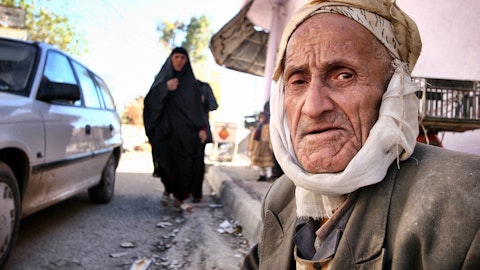Operator: Bruno from Goldman Sachs asks. Where is the local diesel and gasoline price compared to the international?
Milena Lopez: Hi Bruno, Milena Lopez. So when we see the diesel prices, I’m going to talk specifically about the average of February to provide more updated information. We have a diesel price of around COP9,500. When we look at the parity price, it is closer to COP15,000. So we have an effective subsidy of 63%. Nevertheless, when we look at the gasoline prices in February, we see a price of around COP15,700 and the priority price is a little below this. So in reality, what we see right now is a subsidy of around COP2,000 of gasoline facing what we are lacking in diesel. So on one side, diesel, we have a subsidy, and on gasoline, we have — we are a little bit above, which help us to improve our deficit. And with the FEPC questions, well, it is important here to highlight not only that we’re going to have a lower monthly accumulation of FEPC due to the increase of gasoline price that the national government did last year, but this reduction in the market prices will lead us to that.
If we project what the deficit of the prices for 2024, it gives us something around COP3 trillion and COP4 trillion. Of course, these changes according to the exchange rate and the differentials. But in effect, we see that if there is no movements in diesel price, which is not the base scenario, we hope that we have some adjustments. We see at the end of the year, a deficit of — due to FEPC that will be inferior to what we’ve seen in the last two years, which is a great news for the company and for the position of Ecopetrol.
Operator: [indiscernible] has two questions. First one, do you have an update or expectation about the no deductibility of royalties for March due to the Supreme Court? And second, could we see an extraordinary dividend greater to what we — this year to help that fiscal — the tax deficit?
Milena Lopez: Thank you, [indiscernible], for your questions. Milena Lopez again. Yes. So about the Constitutional Court. In November, we had the rule out that says that the royalty prices are deductible — tax deductible. At the beginning of the year, the Ministry of — said an incident of impact — of tax impact. And the Ministry of Treasury has a time that would be like this record metric to eradicate in the court, the sustentation of that, of such tax impact. Once the court receives this, they will accept the incident, discuss it. And during that period of time, they will have an answer. So the important thing here is that at the time the court decides to revise and accept that tax impact incident to — we will suspend that.
And we will have to wait for final ruling. And in Ecopetrol, we will accept what the court says. So right now, we don’t have additional information. Second question about extraordinary dividend. Now up to the date, we haven’t discussed with Treasury Ministry about this, except the payout of 67%, which — of payout, which is taken to the Shareholders’ Meeting.
Operator: Congratulations for the results and milestones. About the possibility of making businesses with PDVSA. How much have you advanced in that option?
Ricardo Roa: Thank you, Jose Daniel. Ricardo Roa, President. The evaluations that we’re doing internally, the possibility of making businesses with PDVSA in the short term are focused on the contract that has been constantly reactivated since 2007 until 2027 between PDVSA and Ecopetrol, where we say that we can transfer. So the interaction that we’ve had in the last months with PDVSA Gas as owner of the transportation — asset transportation, gas transportation is to work hand in hand, inspecting and revising the conditions of — maintaining the commitment that we have to activate actions. To support any emergency in the context of the production exploration. So this is one of the options. In between four or five more that we are talking about in order to attend the demand that we will have, we have a deficit of 169 gigabytes.
So basically, we are, among many options, evaluating the opportunity of working with these legal project. And this will occur as we don’t have any restrictions from VAC that would avoid this transaction.
Operator: From Standard and Poor’s asks, for 2024, what is the capacity you consider for the refineries and how this affect gasoline imports to Colombia?
Alberto Consuegra: Manuela, good day. Alberto Consuegra. Thank you for your question. What are we seeing from the load point of view in 2024, an average between 415,000 and 425,000 barrels. Particularly in the case of imports, well, what is the co-relationship in gasoline? Well, the production capacity of both refineries is between 80,000 and 90,000 barrels depending on the maintenance we have through the year. And the imports are going to be between 40,000 and 50,000 barrels around that. So what do we see in the first months of this year? Well, a fall in imports below that range of 45,000 barrels. This is good news. And nevertheless, we need to await for a reactivation of the demand and this will depend on the behavior of the gasoline prices, international gasoline prices. So this is the variable we’re managing right now. And from the production point of view, we are safe with our plan.
Operator: No more questions. So we give the floor to the President for the final message.
Ricardo Roa: Thank you. Thank you again for your participation. Please keep firm confidence on our company and our subsidiaries with this great team that’s working with us that has shown a very important leadership, Ecopetrol, and the margin of critical conditions of the market situations. We’ll keep working and will keep being responsible to consolidate and to continue to making Ecopetrol the great company it is, not only in Colombia, but with an important participation in each of the economies of the countries we are present at. Thank you very much for your participation. Thank you.
Follow Ecopetrol S A (NYSE:EC)
Follow Ecopetrol S A (NYSE:EC)
Receive real-time insider trading and news alerts





